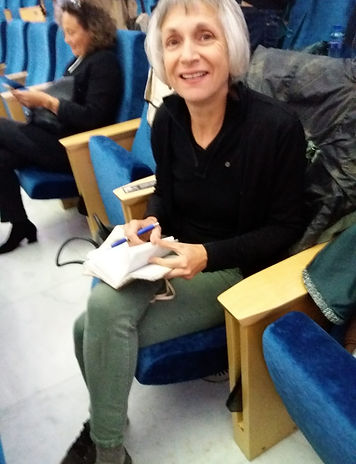Hilary Stern

raised in Seattle, grew up hearing stories of her grandparents who fled poverty and oppression as Eastern European Jews. These stories made her realize that she was born into a society and a family where she had opportunities that she wouldn’t have had, had her grandparents not made the decision to migrate.
After graduating with an MA in TESOL from the University of Washington in 1982, Hilary moved to Washington DC. At the Spanish Education Development (SED) Center, Hilary co-developed and co-taught, with a popular educator from Colombia, a bilingual literacy program using popular education methodology. As part of her research for this program, she visited Solidaridad Humana in New York City, where she met Klaudia Rivera, who encouraged her to travel to Nicaragua to learn from the literacy and popular education efforts after the Nicaraguan Revolution.
While living in Nicaragua between 1987 – 1989, Hilary worked for the NICA School in Estelí, as well as for the Nicaraguan Ministry of Education in Bluefields. In Bluefields, she led a group of local teachers in rewriting the popular education literacy primer in English as part of the Autonomy Process of the Atlantic Coast. The literacy primer used generative themes from the Black Creole English-speaking community to teach reading, writing and critical thinking. In Nicaragua, she was also introduced to Theater of the Oppressed as a vehicle for improving health practices among rural communities.
Hilary returned to the United States in 1987, energized and inspired by the Nicaraguan people and government, and by the potential of popular education and theater as a vehicle for social transformation. Hilary shared her experience in popular education as a national literacy teacher trainer for two years through the Association of Community Based Education in Washington DC and for seven years as a state-wide literacy teacher trainer through Tacoma Community House in the State of Washington.
In 1994 Hilary co-founded Casa Latina in Seattle with David Ayala, a union organizer from El Salvador. Street theater, popular education ESL classes, popular democracy and organizing led to Casa Latina opening a worker center in a parking lot in downtown Seattle. It was in 1997 while organizing day laborers on the corner, that Casa Latina organizers met the band members from Jornaleros del Norte. This chance meeting connected Casa Latina to other day laborer organizers from CHIRLA and IDEPSCA in Los Angeles and WOC (Workers Organizing Committee, which later became Voz) in Portland, eventually leading to the founding of the National Day Laborer Organizing Network (NDLON) in 2001 by 12 worker centers across the country.
After 22 years of serving as the founding Executive Director of Casa Latina, Hilary successfully transitioned from leadership, leaving behind a respected institution that organizes, educates, and lifts up the voices of immigrant day laborers and domestic workers in Seattle.
Hilary currently lives in a small village in Spain but continues to work with NDLON and its members whenever she can to lift up the voices of migrant working people.